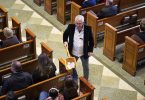by Father Mark Goldasich
“For the love of money is the root of all evils.”
How many times have you heard this passage from the First Letter of Paul to Timothy (6:10) misquoted? Usually, folks tend to leave out “the love of” and that omission alters the meaning of the sentence quite a bit.
But money itself can be a problem, right? The other day, a cousin sent me this email about money:
“It can buy you a house, but not a home.
It can buy you a bed, but not sleep.
It can buy you a clock, but not time.
It can buy you a book, but not knowledge.
It can buy you a position, but not respect.
It can buy you medicine, but not health.
It can buy you blood, but not life.
Indeed, money causes pain and suffering. I tell you all this because I am your friend and, as your friend, I want to relieve your pain and suffering. So, send me all of your money — tens and twenties, please, in unmarked bills — and I will be glad to suffer for you!”
What? Does everything here have to have some inspirational message? OK, check out this quote then: “Money can’t buy you happiness . . . but it will let you be miserable in some really nice places!”
All kidding aside, the Sunday readings the past few weeks have really highlighted the potential dangers of wealth. It can become our god, possess us, lead to greed, make us complacent, and harden our hearts to the cries of the poor. There’s no “gospel of prosperity” being preached here, and yet we still glorify “excess” and belittle “simplicity” in our world.
What’s it like to be really poor? A few weeks ago, I read an excellent reflection in the Sept. 4 preaching resource of Celebration Publications. Deacon Ross Beaudoin wrote about a “mission immersion” that he took part in in Tijuana. Since members of his group wanted to truly encounter and live with the poor, they were issued three challenges: 1) eat what was offered and not seek their own food; 2) beg for food outside of a grocery store for those who were hungry; and 3) set aside things that use energy (like hair dryers, smartphones and laptops) “that the poor probably didn’t own and [for which they] couldn’t afford the utility bill.”
Deacon Beaudoin concluded: “In this experience, we were challenged to internalize and activate the message of what it means to live in solidarity with people of God who do without much of what we consider ordinary, or even necessary.”
Wow! I’ve become quite uncomfortable lately looking around my house. Where did all my “stuff” come from? I fear that I’m proving Mary MacVean, a writer for the Los Angeles Times, absolutely correct when she wrote in March 2014 that the average American home contains about 300,000 items. (And no, I didn’t add an extra “0” in there.) If you’re skeptical about that, start an inventory of your possessions — count individual pens, coins, paper clips, utensils, books, tools, magazines, clothes, cosmetics, toys, etc. Don’t forget to add in “treasures” found in the garage, attic and any storage units you rent. You’ll probably be stunned long before you finish.
In the Gospel parable a couple of weeks ago, Jesus spoke of “dishonest wealth.” Those words stood out for me. I found myself saying, “Well, thank goodness, all of my wealth is honest!” But is it really?
All wealth is dishonest because it promises what it can never deliver: lasting happiness and contentment. But it’s also dishonest in the sense that the price that I paid for many of my possessions probably didn’t adequately compensate the person who manufactured it, particularly if it came from a Third World country. In other words, although I got it cheap, did I really cheat the person who made it out of a living wage?
Jesus advised us to “make friends for yourself with dishonest wealth.” That is, we’re called to use our resources as tools to build relationships, especially with the needy.
Now that autumn is here, it’s time to learn a lesson from the trees. Let’s shed the possessions that we no longer like, use or need and “make friends” by getting that stuff into the hands of people who will appreciate them.
Last Sunday, the Gospel gave us a stark choice: Stand with the rich man or with Lazarus while you’re here on this earth. I don’t know about you, but I’m putting my money on Lazarus.






